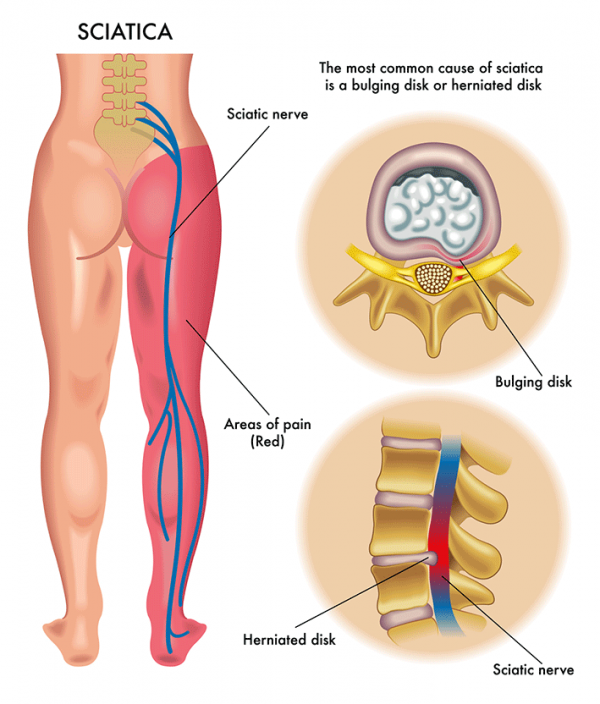Sciatica Symptoms, Causes, and Effective Pain Treatment Services in Dubai

Sciatica
Sciatica is a common neurological condition described as pain, numbness, weakness, or tingling radiating from the lower back to the leg. The symptoms usually occur on one side and vary from mild to unbearable.
It is important to understand that sciatica is not a disease itself. It is rather a symptom caused by an underlying condition. In most cases the underlying condition is a herniated disc, other degenerative disc diseases or spinal stenosis.
The treatment depends on the underlying conditions. Usually Sciatica has a very good prognosis if the treatment is started early enough.
Causes
Sciatica can be caused by any underlying condition that squeezed the sciatic nerve. The sciatic nerve is a large nerve that starts in the lower back and runs down the back of each leg. It controls the muscles and the sensation of the leg and foot.
The most common cause of sciatica results from a lumbar disc herniation directly pushing against the sciatic nerve, but any form of irritation or inflammation can cause discomfort resulting in symptoms of sciatica.
Besides a pinched nerve from a disc or irritation of the sciatic nerve due to pregnancy, other causes include:
- Spinal stenosis
- Cauda equina syndrome
- Internal bleeding
- Infections in or around the lumbar spine
- Nerve irritation caused by adjacent bones, tumors or muscles
- Osteophyte
Conditions that may cause sciatica
• Bulging or herniated disk in the back (most common)
• Other degenerative disk disorders
• Lumbar spinal stenosis
• Piriformis syndrome
• Tumor and others

Signs & Symptoms
The symptoms are depending on anatomical structure and the function of the sciatic nerve (see above).
One of the most common symptoms is lower back pain that radiates down to the affected leg. While the discomfort can be felt anywhere along the nerve canal, sciatica pain radiates explicitly from your lower back to your buttock, hip, and calf.
Sciatica pain varies greatly, from mild to excruciating or a sharp, burning sensation which tends to worsen after prolonged sitting or even just sneezing. Other symptoms include muscle weakness, tingling, numbness in the affected leg and in severe cases, problems controlling your bowels.
The following symptoms may occur in the lower back, the buttock, the hip, and the leg:
• Pain: Often the pain is described as a sharp pain. The pain can be so severe that movements may be difficult.
• Tingling, burning, numbness, or other sensory symptoms
• Weakness of the muscles and problems to move the leg
Symptoms may worsen when you cough, sneeze, or laugh, or when you sit or stand for long periods of time. Being overweight is a risk factor.
Treatment
As a first step, it is important to find the underlying condition causing the sciatica. A neurologist can find the location of the lesion by the symptoms presented. Depending on the location (L4, L5, S1) symptoms in the leg may vary. The treatment depends on the underlying condition and the severity of symptoms. If the symptoms are very mild and there is no danger of worsening, the symptoms may improve on its own.
Typically, sciatica is diagnosed through physical exams and medical history. The symptoms and tests done will help the health care professional to diagnose the condition. In some cases, X-rays, CT scans, MRI scans, Nerve Conduction Velocity and electromyogram are done to rule out some underlying conditions such as tumors.
Treatment varies depending on the intensity of the problem (acute or chronic) and the underlying condition.
Acute sciatica treatment responds well to self-care procedures such as:
- Over the counter (OTC) medication such as painkillers, muscle relaxants, anti-depressant, and anti-inflammatories. Individuals should seek medical advice and review options with their doctor before taking any medicines to avoid severe effects.
- Regular exercise, such as light stretching or walking. Sciatic nerve targeting exercises alleviate pressure on the nerve, provide pain relief, and reduces the need to take medications.
- Hot or cold compression provide pain relief and should be used interchangeably.
Chronic sciatica treatment consists of a combination of self-care and medical treatment procedures, which include:
- Medication: Most patients need pain relieving medication. Moreover, medication that relaxes the muscles and thus reduces the pressure on the nerve may help as well.
- Physiotherapy: Initially it is important to reduce any movement that puts pressure on the sciatic nerve. Moreover, strengthening and stretching exercises may applicable. Applying heat or icing brings relief in some patients.
- CBT: Large studies could show that Cognitive behavioral therapy is effective in reducing the pain and coping with the symptoms.
- Injections: In severe cases injections that reduce the pain and inflammation may help.
- Surgery: Surgery should always be the last option and is not required in the vast majority of cases.
Prognosis
Usually sciatica has a very good prognosis. Depending on the causes of sciatica and duration of the symptoms, the recovery outlook ranges from positive to lasting chronic symptoms. Although, the sooner the treatment process begins, the better the outcome.
Pain Relief from Sciatica
Refers to back pain that radiates from the lower back to the leg. The pain is a result of a problem with the sciatic nerve, a nerve that branches from the lower back down to your buttocks, hips and the back of both legs.
Sciatica commonly results when a bone spur, herniated disk or narrowing of the spine (spinal stenosis) compresses part of the nerve leading to discomfort, inflammation, and often numbness in the affected leg. Naturally, sciatica will only affect one side of your body.
Although the discomfort resulting from this condition can be severe, most cases can be treated without surgery. In fact, 90% of people get pain relief from sciatica after a few weeks with non-operative treatments.
Our Team Of Experts
Since more than ten years GNC is the leading clinic for Neurology in the UAE. All our Sciatica experts are German Board Certified and have minimum professional experience of 25 years. If you are searching for the most trusted Sciatica experts, you came to the right place.
99% of patients would recommend this clinic. See the full patient satisfaction survey here…
Testimonials
``The doctor is the best and everyone's very helpful``
``Excellent doctor``
``I am thankful for the service.``
``Being able to have blood tests and EEG done at the clinic itself was very helpful and convenient. This also allowed my doctor to have fast access to the test results.``
``I'm impressed by the Professor and team professionalism``
``God bless you guys wish you more of success``
``Great service``
``It was a great visit thanks! It really helped me.``
As Seen On












































